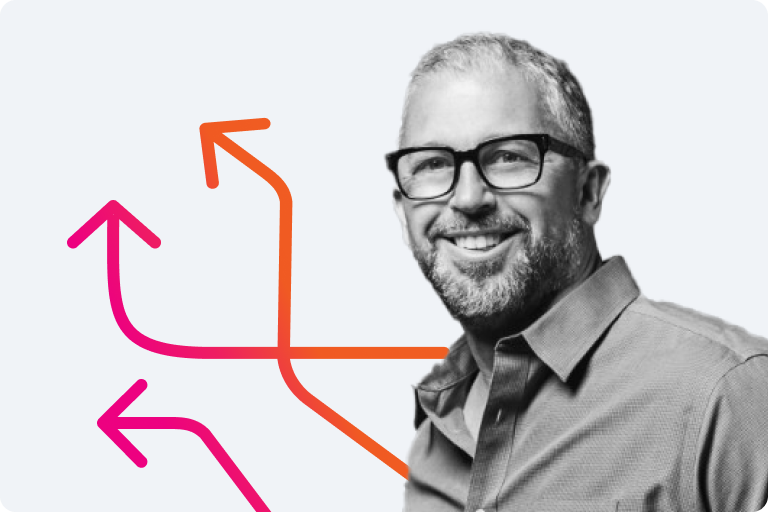Note: This is an auto-generated transcript, which may contain errors.
Hi, everyone. My name is Corey Minton and I am excited to bring you Perspectives by Splunk. Shaun and I are here to provide you with executive takes on today's security and technology topics by leaders, for leaders and our guest today has an opinion that I think many people may share — that artificial intelligence represents what is a massive technological shift in the industry, one that may be as big as the internet. Why do you believe that AI is going to be quite such a large revolution?
Listen, I think uh despite all the noise that you hear and see today about generational AI, I think back to 20 plus years ago when the internet evolved and immediately there was this hype cycle. And the hype cycle was we're all gonna change immediately. Everything is gonna be digital immediately. And if you fast forward 20 years, we've had big winners, digital incumbents who built digital first, and they've taken advantage and they've kind of won. We also have a lot of incumbents that are still trying to figure out their digital channel. I mean, these cycle times have changed. They've shortened. But I think the reality of it is — this is bigger and more powerful over the next 20 years. I think that what we've experienced with internet, with cloud, kind of with mobile; it's quite a big fundamental shift there, isn't it really? From, from, you know, 20 years ago when the internet was around, kind of invented to where we are today.
So, maybe you could tell us a little bit about yourself, your history and maybe a little bit as to how you've come to this conclusion.
Well, I think that a lot of companies have been experimenting with machine learning and data and aspects of AI for some time, certainly for the last 10-15 years. It’s influenced a ton of personalization and recommendations and fraud and operational things. And I think if you look at like any new technology, that business use case really hasn't changed. You know, when I wake up, if I'm a fraud company today, I'm still all about getting fraud better. You know, if I'm an operational company today, I want my operations to be better. If I wanna sell more stuff, I want to sell more stuff. So, when I think about the evolution that we've been on in terms of getting deeper and deeper into customer information and segmentation to really tailor and personalize that, we can harness this technology to do all the things that we were doing before, but faster and better.
Yeah. Excellent. So, you, you've had kind of a storied history in terms of roles that you've played at companies. We're certainly glad to have you here at Splunk. But maybe tell the folks a little bit about your previous roles and some of the ways that you've been involved in leading through technological shifts in the past as well.
Yeah, I mean, I feel like my entire journey has really been out of modernization. I was kind of day one at Amazon when we invented the cloud, when we decentralized the monolith to become micro services. Early on when we built a lot of the first machine learning platforms and personalization to kind of tailor how people kind of bought and viewed things that helped organizational change and all the ways that we thought about, you know, cross functional teams and single threaded teams and our operating models. And the fascinating thing for me was that I thought, well, that was just an Amazon phenomenon, and the reality of it is, as the CTO or CIO at regulated incumbents like Citibank or booking or newer more digital players like neo banks, those same patterns have all applied themselves. Those needs all still exist.
So when we think about, you know, AI as a revolution, one of the most important things that we're trying to flush out for folks and really having a lot of conversations around the world is: What does it mean for technology leaders today? So like in your mind, just at a top level, what does leading in a revolution like this really look like?
Yeah, well, I think any time there's a major shift and you recognize it and you see value in it, you need to really embrace it. You need to make it part of your culture, you know, and that means embedding the right goals and incentives. It means the right education. It means the right inspection mechanism. In my days at Amazon, produced our annual plans every year and sometimes the questions changed. If there was a popular topic like what are you doing about AI, and every team had to answer that question: How am I morphing or evolving my product? How are you inspecting what you're doing? What your advantages are, what your disadvantages are — and how do you iterate through that because it's not all going to get solved in 1 period, right? We're gonna look at this over time and the ones that focus on it and make it part of their culture, they're the ones that are gonna win and make it better.
It's really interesting, isn't it? So, I wonder maybe you can share your opinion on: What do you think this means around people? Maybe talent and recruitment strategies both now and in the future?
Yeah, it's interesting. I mean, I think it's a little early. I think there's a lot of fear and kind of gloom and doom in the hype cycle. I think you could say that about a lot of automation that's happened over the last 20 years. There's no question. A lot of jobs may get simpler or more enriched by the data that comes out of AI. I think we're gonna go through a period of where we are more supervised, too. Less supervised in terms of human involvement, you know, kind of in those things. But I think there's just no substitute uh for their, well, you know, who knows on a long enough time frame, I think for it to literally displace everything. But I think what we're going to see in the next 20 years is there gonna be a lot of jobs that are going to be created that are both higher value working on the development of AI and those things. There are gonna be a lot of jobs that become more open or available because AI makes it easier. I no longer have to find the deep specialist that does that thing because AI can assist that person to help get them to the task. Yeah it's kind of a wild thing that you talked about — the hype cycle and that people are going, “oh, I'm gonna lose my job,” like we should all run for the hills. And I think it's oneof those that we have to be thoughtful about: What are the skills that we're going to try to develop over the future? And I think the lump of labor fallacy is kind of the best way to explain it like any new technology. It's not that we're necessarily deleting as many jobs as we're creating. I think it’s a kind of a fundamental change in people's mindset that any time you have this big change, you don't have to be scared. It's just a shift. So as we're going through that shift, if you're thinking about, you know, cybersecurity leaders, technology leaders — what are some of the practical ways you talked about culture at like a high level? What are some of the practical things that you're seeing some of those great technology leaders, those great cybersecurity leaders do now? That's helpful.
I think you have to plan for where you need speed and where you need augmentation, you know, in your teams and systems. I think there are things where this technology can take your existing staff and team and help accelerate their time to detection; their time to recovery. You know, and by the way, it's interesting — there's a lot of this AI that's being produced and trained off public data sets. And that's fine, and you can learn and come and grow from that. I think the real power comes from these platforms of private data sets. And when you begin to build on that, to automate how you make things operate better, how you make them recover better, how you find in tech security issues better. But again, that comes back to that core mission. You have to make sure your mission hasn't changed. You're a security company, right? You're an operations company, you're a fraud company. And so how do you leverage that technology to automate and expedite that path to resilience? You know, and inevitably, as we all know in e-commerce, we didn't close down the physical stores with mobile. We didn't give away all our computers. With AI, all the jobs are probably not going to go away.
That's true. It's a great way of describing it. It is. So there are so many different opportunities maybe with AI today and coming in the future for a leader, it's really hard to understand what they need to invest in next. So, do you have any advice?
Yeah, I think it's not just AI — if you're a leader in this decade, in this century, the learning never stops. And you know, it is only accelerated and I think AI is only gonna accelerate it further. I think you have to look to your network. You look to make yourself smart. Who are your network or your mentors that you trust, who are the people on your team that you're going to listen to that are closest to this, who are the vendors that have built a competence in this that can help establish the patterns of the products that help you kind of integrate and do more? Look, if you're an innovator and a founder, what's the company you want to build to be AI or digital first? But I think you need to take and talk to these people, talk to the venture capitalists, talk to the private equity folks and make an assessment based on principles and tennis. What's important to you and your business? And then kind of weigh out — where does this begin to fit in so that I can test and learn and evolve and kind of advance the ball?
Yeah, absolutely. But it's, you know, one of the things that's been super popular — we talked about it earlier — this generative AI, right? That's the thing that really burst on to the consciousness of the common person right out there while many of us have been working in AI research and big data for years and years. But, you know, one of the things that they're thinking is that you're gonna automate everything and AI is gonna take over. But I don't feel like that's true. Like, do you believe that humans in the loop is the right answer now? And like, how far in the future is that real full AI automation gonna happen?
Look, I can't predict. I thought that's why you're here. I would be in the market a little bit more that I think that there's no question we're on an arc or continuum that with an increase in compute power and capacity with an increase in data and the curation and the governance of that data and the increase in the learning and the aptitude that we have in terms of our ability to ingest and can afford these things, more will be automated. More will become, and so the world will be a different place. Is it gonna be a different place next week or next month? Absolutely not. I think you have to look at it over time. These shifts are generational and even though we're seeing the hype cycle of this AI tool launched and that launched, and this kind of launch. There's a famous story that Bezos used to tell that at the turn of the century when autos were made, there were hundreds and hundreds, if not thousands of automobile makers and most of them failed. And you bridge down to the top kind of three or four which became the real winners and succeed kind of in this space, right? Those were kind of day one companies. And I think if you look at the internet, there were so many companies and then through the late nineties, so much of that failed and contracted and others. But again, there was a concentration of winners and things that have carried forward. You could say the same thing with Cloud, with Mobile, with various aspects of business. I don't think AI is going to be too much different than that. Maybe we're on a slightly faster cycle, but this is gonna be a generational shift.
Great. So you touched on culture earlier. Let's dive into that a bit more here. With the world likely to be a very different place in maybe a decade or so's time with the invention and driver of AI, what cultural changes do you think we now need to embed into our organizations today and tomorrow to make that shift happen over the next decade?
Well, I mean, the good news is our kids are gonna take care of it. They're gonna be smarter than we are. They're gonna be faster than we are, and they're gonna lap us in no time. I think the way that I think about, you know, I've got a daughter and sons — I think about one's a software engineer, one's finishing up in school. And I think the things that I would have told them to think about studying and investing in a few years ago have changed, and the way you think about data and data intelligence and machine learning and what goes into those things. If there's an interest, I think there's gonna be a lot more value. I think there's gonna be a lot more job creation and things in those areas because look, it's been easy for Adobe and a number of companies to augment their products to quickly produce a thing. Look at the broad swath of everything that would have to be automated. It's just gonna take time.
Yeah, absolutely. So, one of the, the key goals that we had when we set out to do Perspectives, both the website and this podcast, was really a way to help make sure that we're able to help leaders stay abreast of the latest sort of trends and technologies that are happening in cybersecurity and across it and engineering. So I'm curious, as a leader, what's your go to resource? I know you mentioned earlier having a great network and having mentors and folks that you trust. But is there any sort of mailing list or like a website like these that are your favorite resources that you use? And if you say TikTok, it's fine.
I'm embarrassingly not a TikTok, probably should be. I would probably know more about AI if I did. We had to start a business. I'm happy to share some of this offline. They don't kind of come to mind. I do have a handful of podcasts of newsletters and things that I wouldn't say I follow. They're not my playbook for, oh, I must go do and follow this, but they inspire me when I learn about the things that others are doing and the creative things that I thought weren't possible and how I might apply them to a business. And so I think it's up to everyone to build their own network of people, digital resources across the internet, and companies to help understand — who is your mini board of advisors on AI?
Yeah, absolutely. Build that board of advisors. Well, Matt, thank you so much for joining us and having this chat about leading through AI. I hope you all learned quite a bit from the minds of leaders and that's the goal with Splunk’s Perspectives is to curate what's happening in technology and security for executives. So be sure to check out Splunk.com/Perspectives for more. Thanks for joining. I'm Corey and we'll see you soon. Be sure to subscribe to this show on whatever platform you're currently using. If you're listening and you want to watch the show, check out YouTube, and if you're watching what you prefer to listen, check out the Perspectives podcasts wherever you find your podcasts. Speaking of podcasts, you should also check out The Security Detail podcast by Audra Freeman and Kirsty Payne. They explore cyber threats across a variety of industries with some of the most trusted names in cybersecurity. And don't forget to check out Splunk.com/Perspectives for blogs featuring the latest executive takes on today's security and technology topics by leaders and for leaders. Thanks for listening.






